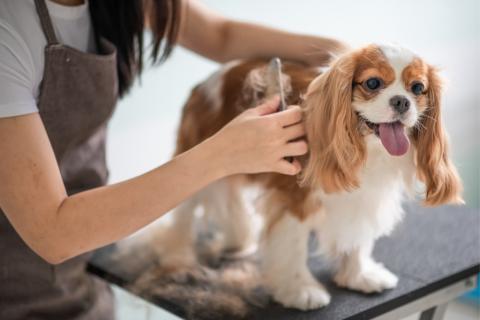MSc Wildlife and Conservation Management
MSc Ecology and Conservation
NQ Countryside Skills with Ranger Training
Technical Apprenticeship in Rural Land Use and Management SCQF Level 8
NQ Countryside Skills and Deer Management for Conservation
Animal physiotherapist
Animal physiotherapists restore and maintain mobility, function, independence and performance in animals.
They carry out treatment on domestic pets, farm animals and exotic pets, with horses, dogs and cats being the most common.
Tasks you would carry out include:
• Assessment
• Massage
• Ultrasound
• Electrotherapy
• Exercise
• Owner education and advice
Working Conditions
Full-time contracts will work about 37.5 hours a week, Monday to Friday. Part-time contracts are also common, but hours may vary depending on the needs of practice.
Salary
Salaries vary with experience, qualifications and between companies, but here's a guide to what you can expect.
£23,000
£28,000
Getting started
You will need to have qualifications and training at higher education level.
The most common routes into the profession are through:
• An undergraduate degree in human physiotherapy, followed by a postgraduate training in animal/veterinary physiotherapy.
• An undergraduate degree in veterinary nursing, followed by a postgraduate training in animal/veterinary physiotherapy.
Employers are looking for the kind of skills you demonstrate at work, which may include:
• Strong interpersonal and communication skills
• Teamwork skills
• An aptitude for problem solving
• Analytical skills
• Administrative and record keeping skills
You’ll also need to be:
• Patient, sensitive, tactful and persistent
• Flexible and adaptable
Next steps
Once you're fully qualified you could find work as a lecturer or self-employed consultant.
If you work in a larger company there should be opportunities for promotion to senior or leadership positions.
Useful links
Animal care worker
This job involves looking after animals living in kennels, catteries or rescue centres and keeping them healthy and happy. The type of animals you might be caring for are dogs, cats, rabbits, hamsters, guinea pigs, donkeys, horses or even parrots.
Responsibilities you would face as an Animal care worker may include:
• Prepare food and feed the animals
• Keep animals clean and groom them
• Exercise dogs in a yard or take them for walks
• Clean out kennels, pens and cages, change bedding
• Look after animals that are ill or distressed
• Answer queries from colleagues and visitors
• Maintain the animal enclosures
If you're working in an animal sanctuary or rescue centre, the animals can be injured or distressed when they arrive. You would then need to calm them down and keep them that way, which can be very difficult . You’d need to be gentle and confident when you handle them during their treatments.
Working Conditions
Animals must be cared for seven days a week, so you might be doing shift work. This could include early starts, evenings and weekends.
Caring for animals can be hard, physical work, and you might be spending time outdoors in all weathers.
Salary
Salaries vary with experience, qualifications and between companies, but here's a guide to what you can expect.
£14,000
£22,500
Getting started
To enter an animal care National Certificate or National Qualifications course, you normally need at least three national 4s (including Maths and English), plus a science at national 5 (Biology is the most useful).
Practical experience can be gained through work, volunteering or an animal care course that includes a work placement.
Experience is an advantage, but training is usually provided.
Employers are looking for people who can:
• Work as part of a team
• Take the lead
• Work with their hands
• Care for animals
Next steps
Experienced animal care workers can become animal care managers, with roles including: a cattery manager, veterinary practice manager, or animal nursing.
Useful links
